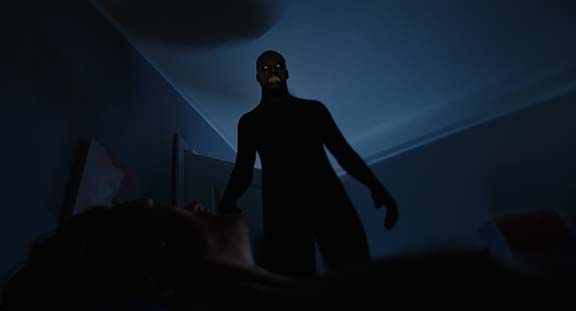 Ross Dinerstein is well-entrenched in the West Coast movie-making world, but there’s one thing this native Houstonian always brings to the table – his Texas manners. Dinerstein, a successful and prolific independent film producer, was recently in Austin showcasing the first films to come out of his new production company, Campfire.
Ross Dinerstein is well-entrenched in the West Coast movie-making world, but there’s one thing this native Houstonian always brings to the table – his Texas manners. Dinerstein, a successful and prolific independent film producer, was recently in Austin showcasing the first films to come out of his new production company, Campfire.
Finding Comfort Food
Movie producer and native Houstonian Ross Dinerstein’s business has moved him away from Texas, but when he lands in the Lone Star State, he races to get his hands of good ol’ Texas grub.
Dinerstein, who recently screened two of his new movie projects at Austin’s South by Southwest Film Conference (SXSW), says he misses his family first and foremost, but “if you take the family question out of it, it’s the food.” He licks his chops at the thought of Tex-Mex and barbecue.
“If I lived in Texas, I would weight 400 pounds. The food is second to none, and Tex-Mex is the finest cuisine. It doesn’t exist outside of Texas!” He adds, “My wife is from L.A., and when we come to Houston, we eat Tex-Mex pretty much every night we’re there. She gets it.”
While enjoying migas for breakfast during his recent Texas visit, Dinerstein said his friends from Los Angeles asked “What are migas?” His response: “I don’t know what migas are, but when you’re in Austin, you have migas for breakfast.”
During SXSW, Dinerstein said he “literally ate myself entirely sick on Franklin Barbecue. It was so good!” He credits Lambert’s for serving good barbecue, too.
What other foods bring him comfort? Houston’s Benjy’s for brunch, he says. “It’s REALLY good!” And he makes no apologies for missing Whataburger, the Texas burger chain that started in Corpus Christi in 1950.
We know Ross’ food weaknesses. What are yours? What is your favorite Comfort Food? Why do you love it so and where do you go to find it?
The two films produced are The Diabolical, a high-concept sci-fi horror film; and Rodney Ascher’s The Nightmare, which follows an investigation into the demonic visions experienced by victims of sleep paralysis.
During his Austin South by Southwest Film Conference (SXSW) visit, Dinerstein sat down with Texas Highways to share some insight on producing movies, the weight of film festivals, and finding that what sets him apart in his business is insistence on holding tight to his Texas roots.
Lois: What took this Texas boy to Hollywood?
Ross: When I grew up, I watched every movie, every television show. It’s all I did.
My parents let me do that because I did pretty well in school and that was what I wanted as my reward. I wanted a TV in my room, a laser disc, dvds. I just loved movies.
Lois: When did you realize that your passion for films could, indeed, become your career?
Ross: I remember the moment when I was a junior in college, I came home from college and told my parents, ‘I know what I want to do. I want to be a producer.’ They said, ‘Great! We don’t know what that means,’ but they were very supportive and said, ‘We want to help you in any way we can.’
I moved to New York after college. I worked in Miramax (a studio and film distibution company) and stayed there for a few years. I then realized that, for my career, I needed to get to Los Angeles. I didn’t really know a lot of people there, so I applied to film school at University of Southern California graduate school and that was really the beginning of it.
Lois: While at USC, you co-produced your first film, “Unknown.” The film, starring Jim Caviezel, Greg Kinnear and Bridget Moynahan, did well financially, and proved to be a great first effort.
Ross: It was beginner’s luck because I didn’t know anything of what I was doing at that point. It was a lot of trial by fire and, over the last 15 years, I’ve made about 25 movies and I’ve made a lot of mistakes, but I feel like I learned from every mistake. I’m trying not to repeat history.
I think I’m at a point now where –– culminating with two movies that I had a blast making with filmmakers that I love, premiering and screening at SXSW in my home state –– I couldn’t ask for anthing more.
I am doing exactly what I wanted to do. I’m just so lucky and I’ve had such a great run.
Lois: What kind of films do you enjoy most?
Ross: I’m pretty focused in that midnight genre –– that kind of elevated core thriller, sci-fi genre. I really love it and I think I’m really good at being a part of those movies. They’re good pieces of business, and they’re great creatively. I’m fortunate that most of these films have premiered at festivals like Sundance, SXSW, Tribeca, Toronto and Fantasia. I’ve been very lucky in that sense. But I really like those movies. I like the creatives involved in that world and in the culture of it –– the filmmakers, producers, distributors and financiers that live in that world. I just really like being a part of that lifestyle.
Lois: What do festivals like Austin’s South By Southwest mean for the movies you produce?
Ross: It’s as crucial as any part of the process, though it’s very hard to get accepted into the festivals. We become so close to the material that we think it’s all great, or we become sick of it and become unable to make a quality judgment about the film. It’s good to have a programmer in these highly-competitive festivals say, ‘The movie’s great and we’d like it to be a part of our festival.’ It’s such an honor, and it’s really the beginning of the next stage of the film.
We’ve done everything that we can to get it to this point, and now we have to unleash it to the world.
Lois: Do you have any anxiety when having your work initially screened before an audience?
Ross: It’s nice to be in this setting where you know people come to the screening because they want the movie to be good. And there is expectation, so you hope their experience is good. They’re in Austin this time of year because they love movies. They don’t want to sit there and make the decision to see that film over another and then to not have the movie be great, but SXSW is a very supportive atmosphere creatively. It’s just fun.
We work so hard to get these movies made and to be here, and to have an audience scream and laugh and wait in line to see your film. It’s great. Plus, the festivals are pretty much the only time that you see your movie on the big screen, too. It’s becoming more and more challenging to get a meaningful theatrical release on your project. It’s all about video-on-demand and getting it on Netflix where you see your films on a 50” television, not a 20-foot tall screen.
Lois: What effect does the prevalence of Netflix, Amazon Streaming and similar outlets have on independent films and the movie-making industry, in general?
Ross: It’s fantastaic. It just means more people can see your films. We don’t make these movies to show to 125 people at a film festival. We make these movies to show the world. Because of all these distribution windows, your movies are seen all over the world. They’re seen multiple times and they generates their own fans. It’s fantastic that a movie that we make in L.A. can be seen on German television. Netflix is now a worldwide provider. So we can get into the homes of the 50 million subscribers who have Netflix.

Lois: Independent films have typically been these small gems, but indy films are becoming more of a ‘norm.’ Do you see that as a threat to the quality of independent film.
Ross: I would say filmmaking is getting more pure and being created for the art of it all. We have to compete for those eyeballs. There’s so much to watch and so many ways to watch it, so if your film is generic, derivative and not that exciting, then why would someone pick that over another project. If you have 10 hours of ‘House of Cards’ to watch, we’re competing with that, so it challenges us to make movies that are interesting and more non-generic.
‘The Nightmare’ is a horror documentary, a non-fiction horror film. There isn’t a lot of that out there. Rodney Ascher has his own sort of brand, and people really want to see what he’s going to do next … What he does after ‘Room 237.’ You’re going to want to watch it because it’s good, it’s different and it’s scary.
Lois: When selecting projects to produce, what sets some films apart from others for you?
Ross: For me, I put so much of my brain, energy, heart and soul into these films, so I have to really love the content, and really love the filmmaker. I get very involved in the creative process from beginning to end, so it’s something that I’d want to see myself, as an audience member. I also think its very important that, if you rip away the elements of the genre, that the themes, stories and characters are relatable in a universal way. That way, someone who might not like haunted house movies can still relate to our lead character’s story, their angst or their problem or conflict. So that’s very important to have a universally strong character, in a non-derivative genre bending way.
With ‘The Diabolical,’ there’s two ways you can pitch the story. It’s a haunted house movie with a twist at the end, or it’s a story about a single mom with two kids who’s struggling to make ends meet and has to do whatever it takes to get by. Part of it is she’s a badass that takes on anything that goes near her kids. We have the same great genre elements to it, but deep down, it’s about a mom protecting her family. Who can’t relate to that?
Lois: What was the impetus for creating your own production company, Campfire?
Ross: It was just the time. I’m 35, and I’ve made a bunch of movies, but I’ve always wanted to do it on my own. I’ve always had a partner. And I was ready to do it. When I decided to start Campfire, I had a company, with a partner, that we ran for 5 years. He’s my best friend, but he wanted to go one direction and I wanted to go the other. We had one of those organic, amicable breakups, and he’s still part of all of my projects.
The timing was right, pluse I had the finiancial backing from Content Media, for which I did 10 consecutive films, so it was a perfect storm of timing and a couple of other things. It’s been invigorating! Bold underline invigorationg.
I’ve just absolutely had so much fun in the nascent stage of the company. I’ve assembled a great team and I have all this support from Content Media. And the first two movies –– one was at Sundance and two were at South by Southwest. It’s not a bad start.
Lois: How do film festivals, like Sundance, compare to South By Southwest?
Ross: Sundance is a little bit of a more of a serious crowd. It’s more focused on the “Sundance competition” and the “Sundance drama.” Austin, by its nature, is a little more rowdier. It’s a little bit more fun and less serious in a good way. And not that the serious nature of Sundance isn’t important. It is. But SXSW has a little bit more relaxed environment.
Also, Sundance is the first fest of the year. People come back from the holidays geared for business. And the first two months of the year have been insane for me. And this (SXSW) is like spring break.
I’m also lucky that both of my films coming into SX have distribution already, so I don’t have to be stressed about that. The nightmare of Sundance is we did not have distribution, so it was a little bit more chaotic then.
Lois: So, you can take the boy out of Texas, but can you take Texas out of the boy?
Ross: In my pitch to anyone – writers, directors – I say, “I’m from Texas.” And I’m very proud of being from Texas. I think the way I operate and treat people is a very Texan way. It’s very respectful, and I say ‘Thank you.’ I write ‘Thank You’ notes, say ‘please,’ and I finish up every single email with ‘Thanks from Ross.’ I think it’s something about being from here and how I was raised.
I’m very proud of it. I’m in Hollywood, I’m in L.A., but I operate outside the system. I say ‘ya’ll’ all the time. I’m very, very proud of my Texas roots. Extremely proud. It’s another reason I’m so honored to be at SXSW. To have two of the 11 in the midnight screenings is a dream come true.
Lois: Does this feel like a homecoming?
Ross: To come back to Texas with two films that I love, and with filmmakers that I’ve had a blast working with –– You couldn’t ask for a better experience. I just feel really lucky.
I’m tickled pink. I’m at a loss for words.








